湘少版四下《Unit 14 Do you have any money》word教案
- 格式:doc
- 大小:25.00 KB
- 文档页数:3
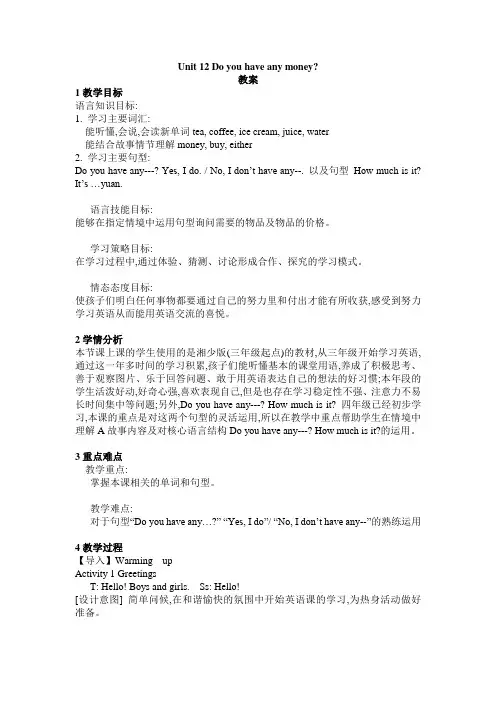
Unit 12 Do you have any money?教案1教学目标语言知识目标:1. 学习主要词汇:能听懂,会说,会读新单词tea, coffee, ice cream, juice, water能结合故事情节理解money, buy, either2. 学习主要句型:Do you have any---? Yes, I do. / No, I don’t have any--. 以及句型How much is it? It’s …yuan.语言技能目标:能够在指定情境中运用句型询问需要的物品及物品的价格。
学习策略目标:在学习过程中,通过体验、猜测、讨论形成合作、探究的学习模式。
情态态度目标:使孩子们明白任何事物都要通过自己的努力里和付出才能有所收获,感受到努力学习英语从而能用英语交流的喜悦。
2学情分析本节课上课的学生使用的是湘少版(三年级起点)的教材,从三年级开始学习英语,通过这一年多时间的学习积累,孩子们能听懂基本的课堂用语,养成了积极思考、善于观察图片、乐于回答问题、敢于用英语表达自己的想法的好习惯;本年段的学生活泼好动,好奇心强,喜欢表现自己,但是也存在学习稳定性不强、注意力不易长时间集中等问题;另外,Do you have any---? How much is it? 四年级已经初步学习,本课的重点是对这两个句型的灵活运用,所以在教学中重点帮助学生在情境中理解A故事内容及对核心语言结构Do you have any---? How much is it?的运用。
3重点难点教学重点:掌握本课相关的单词和句型。
教学难点:对于句型“Do you have any…?” “Yes, I do”/ “No, I don’t have any--”的熟练运用4教学过程【导入】Warming upActivity 1 GreetingsT: Hello! Boys and girls. Ss: Hello![设计意图] 简单问候,在和谐愉快的氛围中开始英语课的学习,为热身活动做好准备。
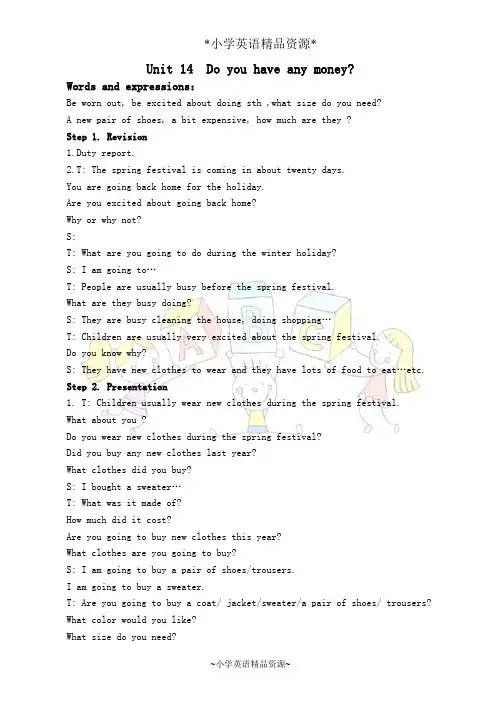
Unit 14 Do you have any money?Words and expressions:Be worn out, be excited about doing sth ,what size do you need?A new pair of shoes, a bit expensive, how much are they ?Step 1. Revision1.Duty report.2.T: The spring festival is coming in about twenty days.You are going back home for the holiday.Are you excited about going back home?Why or why not?S:T: What are you going to do during the winter holiday?S: I am going to…T: People are usually busy before the spring festival.What are they busy doing?S: They are busy cleaning the house, doing shopping…T: Children are usually very excited about the spring festival.Do you know why?S: They have new clothes to wear and they have lots of food to eat…etc. Step 2. Presentation1. T: Children usually wear new clothes during the spring festival.What about you ?Do you wear new clothes during the spring festival?Did you buy any new clothes last year?What clothes did you buy?S: I bought a sweater…T: What was it made of?How much did it cost?Are you going to buy new clothes this year?What clothes are you going to buy?S: I am going to buy a pair of shoes/trousers.I am going to buy a sweater.T: Are you going to buy a coat/ jacket/sweater/a pair of shoes/ trousers? What color would you like?What size do you need?Would you like a cheap or expensive one?How can you know whether the shoes fit you or not?What must you do before you buy clothes?S: I must try them on first and then decide whether to buy or not.2.T: You are wearing a pair of sports shoes today.What size are they ?When did you buy them?How much did they cost?What are they made of? (leather, cloth)Do you feel comfortable in these sports shoes?What will you do if they are worn out?S: I will buy a new pair.3. T: Miqiko and her friend Miyoco are doing shopping now .What are they going to buy in the shop?Please read the dialogue quickly and then find out the answer to my questions.4. Ask more questions.a. Why is Miqiko going to buy a new pair of tennis shoes?b. What about Miyoko?c. When did they go shopping?d. What sizesdid Miyoko need?e. What size did Miqiko need?f. What were the shoes made of?g. How much were the shoes?h. What did Miqiko think of the price of the shoes?i. How did she feel after she tried the shoes on?j. Did Miqiko take the shoes at last?Step 3. Presentation1.T: Next Sunday is your brother’s birthday .You want to buy a sweater for him.2.T: You are going to take part in an evening party. You need a new dress.Your mother and you go shopping.。
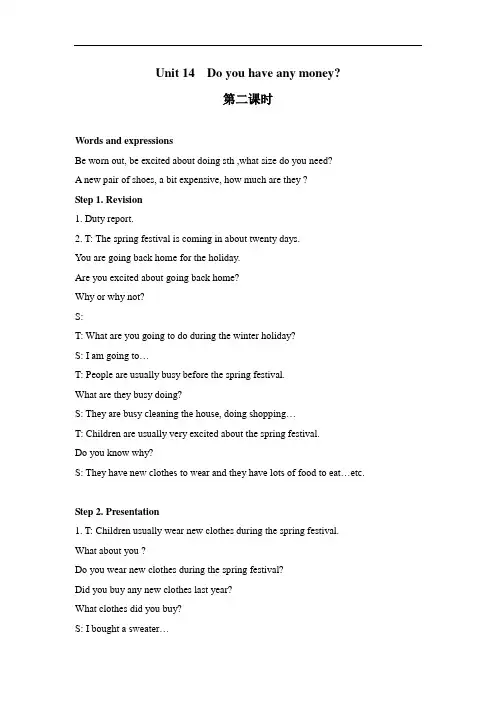
Unit 14 Do you have any money?第二课时Words and expressionsBe worn out, be excited about doing sth ,what size do you need?A new pair of shoes, a bit expensive, how much are they ?Step 1. Revision1. Duty report.2. T: The spring festival is coming in about twenty days.You are going back home for the holiday.Are you excited about going back home?Why or why not?S:T: What are you going to do during the winter holiday?S: I am going to…T: People are usually busy before the spring festival.What are they busy doing?S: They are busy cleaning the house, doing shopping…T: Children are usually very excited about the spring festival.Do you know why?S: They have new clothes to wear and they have lots of food to eat…etc.Step 2. Presentation1. T: Children usually wear new clothes during the spring festival. What about you ?Do you wear new clothes during the spring festival?Did you buy any new clothes last year?What clothes did you buy?S: I bought a sweater…T: What was it made of?How much did it cost?Are you going to buy new clothes this year?What clothes are you going to buy?S: I am going to buy a pair of shoes/trousers.I am going to buy a sweater.T: Are you going to buy a coat/ jacket/sweater/a pair of shoes/ trousers? What color would you like?What size do you need?Would you like a cheap or expensive one?How can you know whether the shoes fit you or not?What must you do before you buy clothes?S: I must try them on first and then decide whether to buy or not.2.T: You are wearing a pair of sports shoes today.What size are they ?When did you buy them?How much did they cost?What are they made of? (leather,cloth)Do you feel comfortable in these sports shoes?What will you do if they are worn out?S: I will buy a new pair.3.T: Miqiko and her friend Miyoco are doing shopping now .What are they going to buy in the shop?Please read the dialogue quickly and then find out the answer to my questions.4.Ask more questions.a. Why is Miqiko going to buy a new pair of tennis shoes?b. What about Miyoko?c. When did they go shopping?d. What sizesdid Miyoko need?e. What size did Miqiko need?f. What were the shoes made of?g. How much were the shoes?h. What did Miqiko think of the price of the shoes?i. How did she feel after she tried the shoes on?j. Did Miqiko take the shoes at last?Step 3. Presentation1.T: Next Sunday is your brother’s birthday .You want to buy a sweater for him.2.T: You are going to take part in an evening party. You need a new dress. Your mother and you go shopping.。
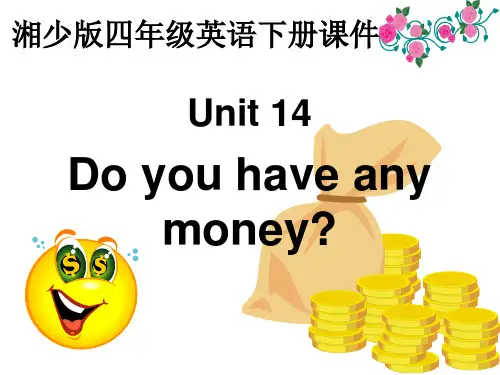
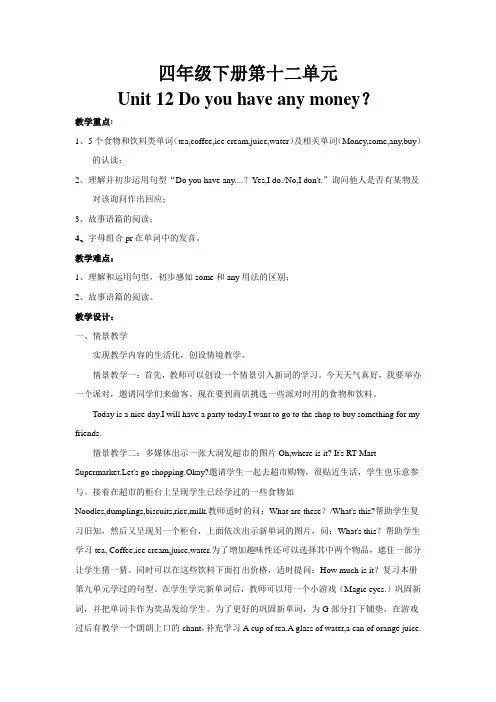
四年级下册第十二单元Unit 12 Do you have any money?教学重点:1、5个食物和饮料类单词(tea,coffee,ice cream,juice,water)及相关单词(Money,some,any,buy)的认读;2、理解并初步运用句型“Do you have any....?Yes,I do./No,I don't.”询问他人是否有某物及对该询问作出回应;3、故事语篇的阅读;4、字母组合pr在单词中的发音。
教学难点:1、理解和运用句型,初步感知some和any用法的区别;2、故事语篇的阅读。
教学设计:一、情景教学实现教学内容的生活化,创设情境教学。
情景教学一:首先,教师可以创设一个情景引入新词的学习。
今天天气真好,我要举办一个派对,邀请同学们来做客。
现在要到商店挑选一些派对时用的食物和饮料。
Today is a nice day.I will have a party today.I want to go to the shop to buy something for my friends.情景教学二:多媒体出示一张大润发超市的图片Oh,where is it? It's RT-Mart Supermarket.Let's go shopping.Okay?邀请学生一起去超市购物,很贴近生活,学生也乐意参与。
接着在超市的柜台上呈现学生已经学过的一些食物如Noodles,dumplings,biscuits,rice,milk.教师适时的问:What are these?/What's this?帮助学生复习旧知,然后又呈现另一个柜台,上面依次出示新单词的图片,问:What's this?帮助学生学习tea, Coffee,ice cream,juice,water.为了增加趣味性还可以选择其中两个物品,遮住一部分让学生猜一猜。
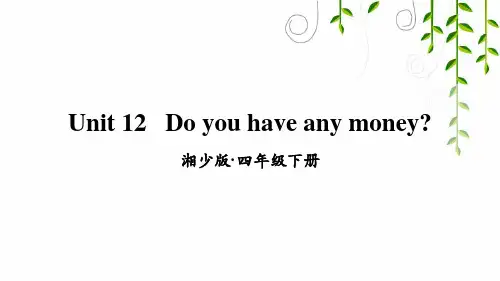
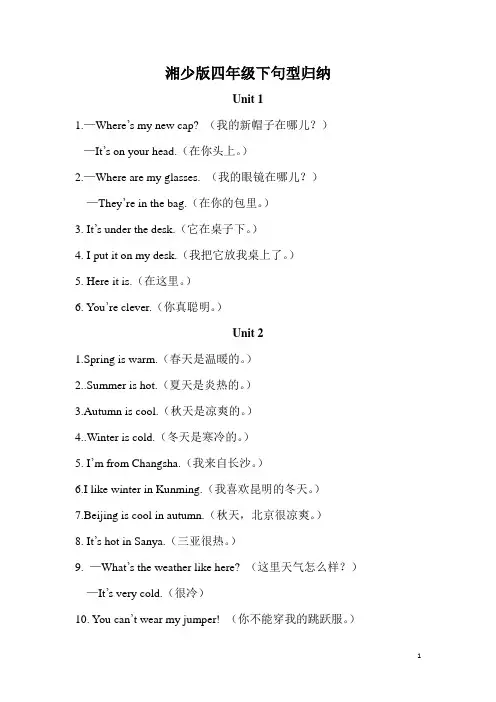
湘少版四年级下句型归纳Unit 11.—Where’s my new cap? (我的新帽子在哪儿?)—It’s on your head.(在你头上。
)2.—Where are my glasses. (我的眼镜在哪儿?)—They’re in the bag.(在你的包里。
)3. It’s under the desk.(它在桌子下。
)4. I put it on my desk.(我把它放我桌上了。
)5. Here it is.(在这里。
)6. You’re clever.(你真聪明。
)Unit 21.Spring is warm.(春天是温暖的。
)2..Summer is hot.(夏天是炎热的。
)3.Autumn is cool.(秋天是凉爽的。
)4..Winter is cold.(冬天是寒冷的。
)5. I’m from Changsha.(我来自长沙。
)6.I like winter in Kunming.(我喜欢昆明的冬天。
)7.Beijing is cool in autumn.(秋天,北京很凉爽。
)8. It’s hot in Sanya.(三亚很热。
)9. —What’s the weather like here? (这里天气怎么样?)—It’s very cold.(很冷)10. You can’t wear my jumper! (你不能穿我的跳跃服。
)11. Be careful! (小心!)12.Winter is snowy.(冬天下雪。
)Unit 31.—What can you see? (你能看见什么?)—I can see a river.(我能看见一条河。
)—I can see white clouds and the blue sky. (我能看见白云和蓝天。
)2.What can you see in the picture? (在图片中你能看到什么?)3. Look down! (往下看!)4. It’s nice!(真漂亮!)5.You can see a town.(你能看见一个小镇。
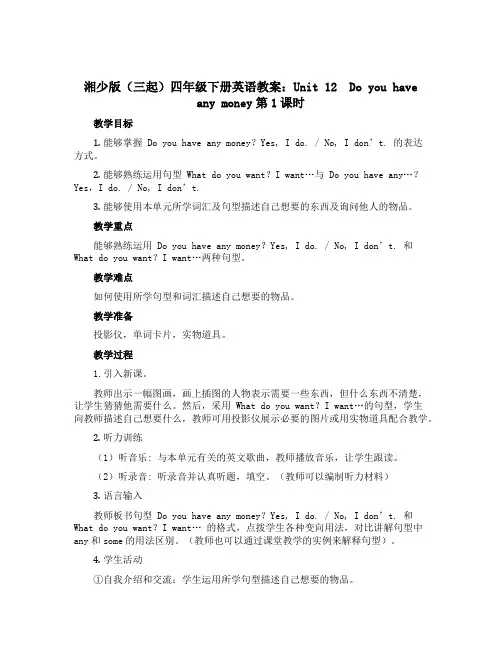
湘少版(三起)四年级下册英语教案:Unit 12 Do you haveany money第1课时教学目标1.能够掌握 Do you have any money?Yes, I do. / No, I don’t. 的表达方式。
2.能够熟练运用句型 What do you want?I want…与Do you have any…?Yes,I do. / No, I don’t.3.能够使用本单元所学词汇及句型描述自己想要的东西及询问他人的物品。
教学重点能够熟练运用 Do you have any money?Yes, I do. / No, I don’t. 和What do you want?I want…两种句型。
教学难点如何使用所学句型和词汇描述自己想要的物品。
教学准备投影仪,单词卡片,实物道具。
教学过程1.引入新课。
教师出示一幅图画,画上插图的人物表示需要一些东西,但什么东西不清楚,让学生猜猜他需要什么。
然后,采用 What do you want?I want…的句型,学生向教师描述自己想要什么,教师可用投影仪展示必要的图片或用实物道具配合教学。
2.听力训练(1)听音乐: 与本单元有关的英文歌曲,教师播放音乐,让学生跟读。
(2)听录音: 听录音并认真听题,填空。
(教师可以编制听力材料)3.语言输入教师板书句型 Do you have any money?Yes, I do. / No, I don’t. 和What do you want?I want… 的格式,点拨学生各种变向用法,对比讲解句型中any和some的用法区别。
(教师也可以通过课堂教学的实例来解释句型)。
4.学生活动①自我介绍和交流:学生运用所学句型描述自己想要的物品。
②学生分组活动:同组分别扮演卖东西的店员和顾客两个角色,顾客询问店员店里有没有自己所需要的物品, 店员可以动手拿出相关的实物道具,展现不同种类的商品,帮助学生理解和记忆词汇。
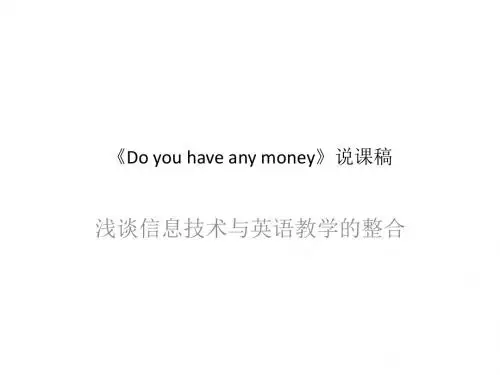
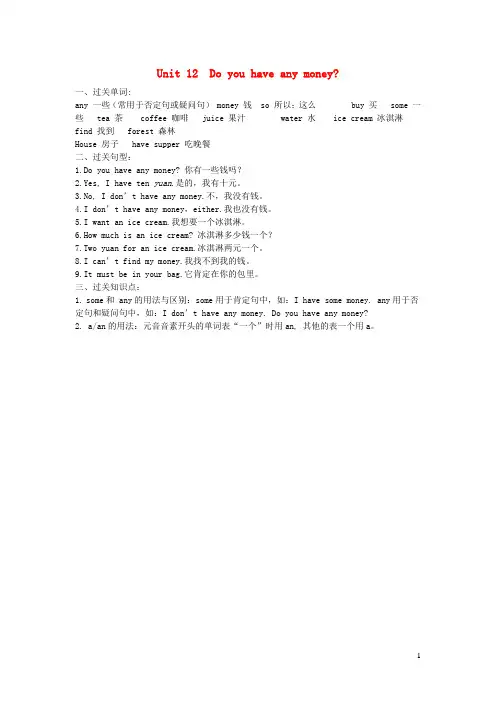
Unit 12 Do you have any money?
一、过关单词:
any 一些(常用于否定句或疑问句) money 钱 so 所以;这么 buy 买 some 一些 tea 茶 coffee 咖啡 juice 果汁 water 水 ice cream 冰淇淋
find 找到 forest 森林
House 房子 have supper 吃晚餐
二、过关句型:
1.Do you have any money? 你有一些钱吗?
2.Yes, I have ten yuan.是的,我有十元。
3.No, I don’t have any money.不,我没有钱。
4.I don’t have any money,either.我也没有钱。
5.I want an ice cream.我想要一个冰淇淋。
6.How much is an ice cream? 冰淇淋多少钱一个?
7.Two yuan for an ice cream.冰淇淋两元一个。
8.I can’t find my money.我找不到我的钱。
9.It must be in your bag.它肯定在你的包里。
三、过关知识点:
1.some和 any的用法与区别:some用于肯定句中,如:I have some money. any用于否定句和疑问句中,如:I don’t have any money. Do you have any money?
2. a/an的用法:元音音素开头的单词表“一个”时用an, 其他的表一个用a。
1。
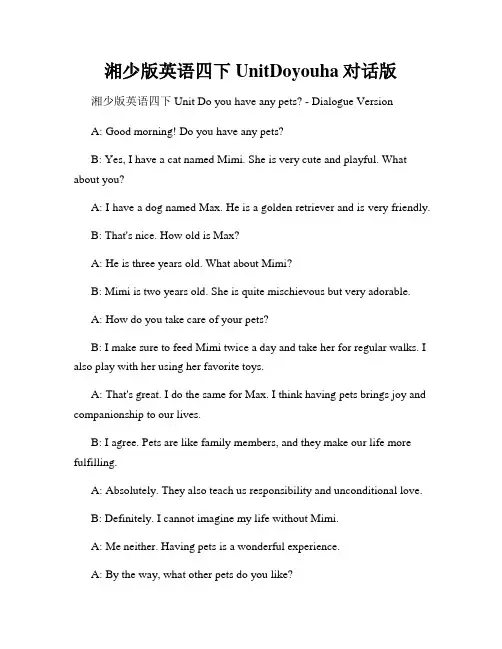
湘少版英语四下UnitDoyouha对话版湘少版英语四下Unit Do you have any pets? - Dialogue VersionA: Good morning! Do you have any pets?B: Yes, I have a cat named Mimi. She is very cute and playful. What about you?A: I have a dog named Max. He is a golden retriever and is very friendly.B: That's nice. How old is Max?A: He is three years old. What about Mimi?B: Mimi is two years old. She is quite mischievous but very adorable.A: How do you take care of your pets?B: I make sure to feed Mimi twice a day and take her for regular walks. I also play with her using her favorite toys.A: That's great. I do the same for Max. I think having pets brings joy and companionship to our lives.B: I agree. Pets are like family members, and they make our life more fulfilling.A: Absolutely. They also teach us responsibility and unconditional love.B: Definitely. I cannot imagine my life without Mimi.A: Me neither. Having pets is a wonderful experience.A: By the way, what other pets do you like?B: I also like fish. They are low-maintenance pets and can be very peaceful to watch.A: That's true. Fish tanks can create a calming atmosphere in our homes.B: I find it fascinating to observe their colorful scales and their graceful movements in the water.A: Yeah, it can be quite mesmerizing. Do you have any fish?B: No, not yet. I am planning to set up an aquarium soon and get some colorful fish.A: That sounds like a great idea. It will be a beautiful addition to your home.B: Thank you! I am really excited about it.A: Besides cats, dogs, and fish, are there any other pets that you find interesting?B: I am also fascinated by birds. Their ability to fly and their beautiful songs are captivating.A: I agree. Birds have such unique characteristics and can be great companions too.B: Yes, some people even teach their birds to talk and mimic human speech.A: That's incredible. It must be amusing to have a bird that can communicate with you.B: Definitely. It requires patience and consistent training, but the results can be rewarding.A: I might consider getting a bird in the future. It seems like a delightful experience.A: It's amazing how many different types of pets people choose to have.B: Yes, everyone has their own preferences and reasons for choosing particular pets.A: Some people even keep exotic pets like snakes or reptiles. They require special care and knowledge.B: That's true. Exotic pets have specific dietary and environmental needs that must be met.A: It's important for people to research and understand the requirements of any pet before getting one.B: Absolutely. Pets should be treated with love and respect, and their well-being should always be a priority.A: Indeed. Having a pet is a lifelong commitment, and it's essential to provide them with a happy and healthy life.B: Agreed. They bring us joy, love, and companionship, and in return, it's our responsibility to take care of them.A: Pets truly make our lives better, and the bond we share with them is priceless.B: I couldn't agree more. Our pets become part of our families and leave lasting footprints on our hearts.A: Well said. Let's cherish our pets and continue to create beautiful memories with them.[Word Count: 507 words]。
Unit 14 Do you have any money?
第一课时
Words and expressions
Be worn out, be excited about doing sth ,what size do you need?
A new pair of shoes, a bit expensive, how much are they ?
Step 1. Revision
1.Duty report.
2.T: The spring festival is coming in about twenty days.
You are going back home for the holiday.
Are you excited about going back home?
Why or why not?
S:
T: What are you going to do during the winter holiday?
S: I am going to…
T: People are usually busy before the spring festival.
What are they busy doing?
S: They are busy cleaning the house, doing shopping…
T: Children are usually very excited about the spring festival.
Do you know why?
S: They have new clothes to wear and they have lots of food to eat…etc.
Step 2. Presentation
1. T: Children usually wear new clothes during the spring festival. What about you ?
Do you wear new clothes during the spring festival?
Did you buy any new clothes last year?
What clothes did you buy?
S: I bought a sweater…
T: What was it made of?
How much did it cost?
Are you going to buy new clothes this year?
What clothes are you going to buy?
S: I am going to buy a pair of shoes/trousers.
I am going to buy a sweater.
T: Are you going to buy a coat/ jacket/sweater/a pair of shoes/ trousers? What color would you like?
What size do you need?
Would you like a cheap or expensive one?
How can you know whether the shoes fit you or not?
What must you do before you buy clothes?
S: I must try them on first and then decide whether to buy or not.
2.T: You are wearing a pair of sports shoes today.
What size are they ?
When did you buy them?
How much did they cost?
What are they made of? (leather, cloth)
Do you feel comfortable in these sports shoes?
What will you do if they are worn out?
S: I will buy a new pair.
3. T: Miqiko and her friend Miyoco are doing shopping now .
What are they going to buy in the shop?
Please read the dialogue quickly and then find out the answer to my questions.
4. Ask more questions.
a. Why is Miqiko going to buy a new pair of tennis shoes?
b. What about Miyoko?
c. When did they go shopping?
d. What sizesdid Miyoko need?
e. What size did Miqiko need?
f. What were the shoes made of?
g. How much were the shoes?
h. What did Miqiko think of the price of the shoes?
i. How did she feel after she tried the shoes on?
j. Did Miqiko take the shoes at last?
Step 3. Presentation
1.T: Next Sunday is your brother’s birthday .You want to buy a sweater for him.
2.T: You are going to take part in an evening party. You need a new dress.Your mother and you go shopping.。